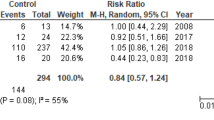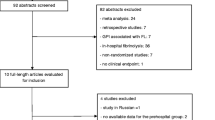Summary
Background and objective
Cardiogenic shock (CS) conveys a high mortality risk. A cardiac assist device may serve as bridge to patient recovery. We aimed to provide a pooled estimate on mortality and complications from studies evaluating the use of the left ventricular assist device Impella in CS following acute myocardial infarction. In addition, we evaluated whether mortality risk differed with device placement before or after percutaneous coronary intervention (PCI).
Methods
We searched Medline, Embase and Web of Science from 2005 until July 2019 for observational studies or clinical trials on this specific patient group. Studies were required to report on 30-day all-cause mortality and device-related complications. We calculated pooled proportions with 95% confidence intervals (CI) using random effects models and the inverse variance method.
Results
Overall, 671 patients from 11 studies (2 randomized and 9 observational) were included. Pooled proportions showed a 30-day mortality of 54.6% (95% CI 47.3–61.8; P = 0.22; I2 = 65.8%). Among complications, major bleeding was found in 19.9% (95% CI 14.2–27.3; P < 0.05; I2 = 69.1%), hemolysis in 10.5% (95% CI 7.2–15.0; P < 0.05; I2 = 52.1%), limb ischemia in 5.0% (95% CI 2.6–9.5; P < 0.05; I2 = 48.3%) and stroke in 3.8% of patients (95% CI 2.4–5.9; P < 0.05; I2 = 0%). Sensitivity analysis demonstrated a statistically significant risk reduction in 30-day mortality when Impella was implanted prior to PCI as compared to after PCI, risk ratio (RR): 0.71, CI 0.58–0.86, P = 0.001, I2 = 0%.
Conclusion
Pooled estimates of Impella use in myocardial infarction with CS revealed a high 30-day mortality; however, as compared to post-PCI, Impella initiation prior to PCI was associated with a survival benefit.





Similar content being viewed by others
References
Kolte D, Khera S, Aronow WS, Mujib M, Palaniswamy C, Sule S, et al. Trends in incidence, management, and outcomes of cardiogenic shock complicating ST-elevation myocardial infarction in the United States. J Am Heart Assoc. 2014;3(1):e590.
Thiele H, Ohman EM, Desch S, Eitel I, de Waha S. Management of cardiogenic shock. Eur Heart J. 2015;36(20):1223–30.
Neumann FJ, Sousa-Uva M, Ahlsson A, Alfonso F, Banning AP, Benedetto U, et al. 2018 ESC/EACTS Guidelines on myocardial revascularization. Eur Heart J. 2019;40(2):87–165.
Ponikowski P, Voors AA, Anker SD, Bueno H, Cleland JGF, Coats AJS, et al. 2016 ESC Guidelines for the diagnosis and treatment of acute and chronic heart failure: The Task Force for the diagnosis and treatment of acute and chronic heart failure of the European Society of Cardiology (ESC)Developed with the special contribution of the Heart Failure Association (HFA) of the ESC. Eur Heart J. 2016;37(27):2129–200.
O’Gara PT, Kushner FG, Ascheim DD, Casey DE Jr., Chung MK, de Lemos JA, et al. 2013 ACCF/AHA guideline for the management of ST-elevation myocardial infarction: a report of the American College of Cardiology Foundation/American Heart Association Task Force on Practice Guidelines. J Am Coll Cardiol. 2013;61(4):e78–e140.
Burzotta F, Trani C, Doshi SN, Townend J, Van Geuns RJ, Hunziker P, et al. Impella ventricular support in clinical practice: collaborative viewpoint from a European expert user group. Int J Cardiol. 2015;201:684–91.
Batsides G, Massaro J, Cheung A, Soltesz E, Ramzy D, Anderson MB. Outcomes of Impella 5.0 in cardiogenic shock: a systematic review and meta-analysis. Innovations (Phila). 2018;13(4):254–60.
Cheng JM, den Uil CA, Hoeks SE, van der Ent M, Jewbali LS, van Domburg RT, et al. Percutaneous left ventricular assist devices vs. intra-aortic balloon pump counterpulsation for treatment of cardiogenic shock: a meta-analysis of controlled trials. Eur Heart J. 2009;30(17):2102–8.
Thiele H, Jobs A, Ouweneel DM, Henriques JPS, Seyfarth M, Desch S, et al. Percutaneous short-term active mechanical support devices in cardiogenic shock: a systematic review and collaborative meta-analysis of randomized trials. Eur Heart J. 2017;38(47):3523–31.
O’Neill WW, Schreiber T, Wohns DH, Rihal C, Naidu SS, Civitello AB, et al. The current use of Impella 2.5 in acute myocardial infarction complicated by cardiogenic shock: results from the USpella Registry. J Interv Cardiol. 2014;27(1):1–11.
Higgins JP, Altman DG, Gotzsche PC, Juni P, Moher D, Oxman AD, et al. The Cochrane Collaboration’s tool for assessing risk of bias in randomised trials. BMJ. 2011;343:d5928.
National Heart, Lung and Blood Institute. Quality assessment tool for observational cohort and cross-sectional studies. 2017.
Moher D, Liberati A, Tetzlaff J, Altman DG, PRISMA Group. Preferred reporting items for systematic reviews and meta-analyses: the PRISMA statement. BMJ. 2009;339:b2535.
Stroup DF, Berlin JA, Morton SC, Olkin I, Williamson GD, Rennie D, et al. Meta-analysis of observational studies in epidemiology: a proposal for reporting. Meta-analysis Of Observational Studies in Epidemiology (MOOSE) group. JAMA. 2000;283(15):2008–12.
Seyfarth M, Sibbing D, Bauer I, Frohlich G, Bott-Flugel L, Byrne R, et al. A randomized clinical trial to evaluate the safety and efficacy of a percutaneous left ventricular assist device versus intra-aortic balloon pumping for treatment of cardiogenic shock caused by myocardial infarction. J Am Coll Cardiol. 2008;52(19):1584–8.
Engstrom AE, Cocchieri R, Driessen AH, Sjauw KD, Vis MM, Baan J, et al. The Impella 2.5 and 5.0 devices for ST-elevation myocardial infarction patients presenting with severe and profound cardiogenic shock: the Academic Medical Center intensive care unit experience. Crit Care Med. 2011;39(9):2072–9.
Lauten A, Engstrom AE, Jung C, Empen K, Erne P, Cook S, et al. Percutaneous left-ventricular support with the Impella‑2.5‑assist device in acute cardiogenic shock: results of the Impella-EUROSHOCK-registry. Circ Heart Fail. 2013;6(1):23–30.
Schroeter MR, Kohler H, Wachter A, Bleckmann A, Hasenfuss G, Schillinger W. Use of the Impella device for acute coronary syndrome complicated by cardiogenic shock—experience from a single heart center with analysis of long-term mortality. J Invasive Cardiol. 2016;28(12):467–72.
Meraj PM, Doshi R, Schreiber T, Maini B, O’Neill WW. Impella 2.5 initiated prior to unprotected left main PCI in acute myocardial infarction complicated by cardiogenic shock improves early survival. J Interv Cardiol. 2017;30(3):256–63.
Ouweneel DM, de Brabander J, Karami M, Sjauw KD, Engstrom AE, Vis MM, et al. Real-life use of left ventricular circulatory support with Impella in cardiogenic shock after acute myocardial infarction: 12 years AMC experience. Eur Heart J Acute Cardiovasc Care. 2019;8(4):338–49.
Ouweneel DM, Eriksen E, Seyfarth M, Henriques JP. Percutaneous mechanical circulatory support versus intra-aortic balloon pump for treating cardiogenic shock: meta-analysis. J Am Coll Cardiol. 2017;69(3:358–60.
Mourad M, Gaudard P, De La Arena P, Eliet J, Zeroual N, Rouviere P, et al. Circulatory support with extracorporeal membrane oxygenation and/or Impella for cardiogenic shock during myocardial infarction. ASAIO J. 2018;64(6):708–14.
Pieri M, Sorrentino T, Oppizzi M, Melisurgo G, Lembo R, Colombo A, et al. The role of different mechanical circulatory support devices and their timing of implantation on myocardial damage and mid-term recovery in acute myocardial infarction related cardiogenic shock. J Interv Cardiol. 2018;31(6):717–24.
Loehn T, O’Neill WW, Lange B, Pfluecke C, Schweigler T, Mierke J, et al. Long term survival after early unloading with Impella CP((R)) in acute myocardial infarction complicated by cardiogenic shock. Eur Heart J Acute Cardiovasc Care. 2018; https://doi.org/10.1177/2048872618815063.
Ouweneel DM, Eriksen E, Sjauw KD, van Dongen IM, Hirsch A, Packer EJ, et al. Percutaneous mechanical circulatory support versus intra-aortic balloon pump in cardiogenic shock after acute myocardial infarction. J Am Coll Cardiol. 2017;69(3):278–87.
Zeymer U, Thiele H. Mechanical support for cardiogenic shock: lost in translation? J Am Coll Cardiol. 2017;69(3):288–90.
Wernly B, Seelmaier C, Leistner D, Stahli BE, Pretsch I, Lichtenauer M, et al. Mechanical circulatory support with Impella versus intra-aortic balloon pump or medical treatment in cardiogenic shock—a critical appraisal of current data. Clin Res Cardiol. 2019; https://doi.org/10.1007/s00392-019-01458-2.
Schrage B, Ibrahim K, Loehn T, Werner N, Sinning JM, Pappalardo F, et al. Impella support for acute myocardial infarction complicated by cardiogenic shock. Circulation. 2019;139(10):1249–58.
Dhruva SS, Ross JS, Mortazavi BJ, Hurley NC, Krumholz HM, Curtis JP, et al. Association of use of an intravascular microaxial left ventricular assist device vs intra-aortic balloon pump with in-hospital mortality and major bleeding among patients with acute myocardial infarction complicated by cardiogenic shock. JAMA. 2020; https://doi.org/10.1001/jama.2020.0254.
Udesen NJ, Moller JE, Lindholm MG, Eiskjaer H, Schafer A, Werner N, et al. Rationale and design of DanGer shock: Danish-German cardiogenic shock trial. Am Heart J. 2019;214:60–8.
Flaherty MP, Khan AR, O’Neill WW. Early initiation of Impella in acute myocardial infarction complicated by cardiogenic shock improves survival: a meta-analysis. JACC Cardiovasc Interv. 2017;10(17):1805–6.
Kapur NK, Paruchuri V, Urbano-Morales JA, Mackey EE, Daly GH, Qiao X, et al. Mechanically unloading the left ventricle before coronary reperfusion reduces left ventricular wall stress and myocardial infarct size. Circulation. 2013;128(4):328–36.
Roos JB, Doshi SN, Konorza T, Palacios I, Schreiber T, Borisenko OV, et al. The cost-effectiveness of a new percutaneous ventricular assist device for high-risk PCI patients: mid-stage evaluation from the European perspective. J Med Econ. 2013;16(3):381–90.
Maini B, Gregory D, Scotti DJ, Buyantseva L. Percutaneous cardiac assist devices compared with surgical hemodynamic support alternatives: cost-effectiveness in the emergent setting. Catheter Cardiovasc Interv. 2014;83(6):E183–E92.
Maini B, Scotti DJ, Gregory D. Health economics of percutaneous hemodynamic support in the treatment of high-risk cardiac patients: a systematic appraisal of the literature. Expert Rev Pharmacoecon Outcomes Res. 2014;14(3):403–16.
Kapur NK, Alkhouli MA, DeMartini TJ, Faraz H, George ZH, Goodwin MJ, et al. Unloading the left ventricle before reperfusion in patients with anterior ST-segment-elevation myocardial infarction. Circulation. 2019;139(3):337–46.
Funding
This work was supported by an unrestricted grant from the Association for the Promotion of Research in Arteriosclerosis, Thrombosis and Vascular Biology (ATVB) and by the Ludwig Boltzmann Cluster for Cardiovascular Research, Vienna, Austria. The study funders had no role in the design or conduct of the study.
Author information
Authors and Affiliations
Corresponding author
Ethics declarations
Conflict of interest
K.G. Vargas, B. Jäger, C.C. Kaufmann, A. Biagioli, S. Watremez, F. Gatto, C. Özbek, A. Razouk, A. Geppert, and K. Huber declare that they have no competing interests.
Additional information
Publisher’s Note
Springer Nature remains neutral with regard to jurisdictional claims in published maps and institutional affiliations.
Caption Electronic Supplementary Material
Rights and permissions
About this article
Cite this article
Vargas, K.G., Jäger, B., Kaufmann, C.C. et al. Impella in cardiogenic shock following acute myocardial infarction: a systematic review and meta-analysis. Wien Klin Wochenschr 132, 716–725 (2020). https://doi.org/10.1007/s00508-020-01712-y
Received:
Accepted:
Published:
Issue Date:
DOI: https://doi.org/10.1007/s00508-020-01712-y




